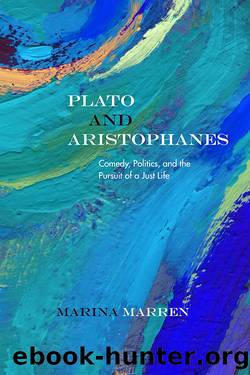Plato and Aristophanes by Marina Marren;

Author:Marina Marren;
Language: eng
Format: epub
Publisher: Chicago Distribution Center (CDC Presses)
The Founders of the New CitiesâSex, Law, and Honor in the Republic and the Birds
The opening of the Republic and the opening of the Birds appear to indicate two opposite directions. Sallis provides several pieces of evidence for his claim that the âRepublic begins with Socratesâ descent into Hades.â14 The comedy, on the other hand, opens with the search for one Tereus, a king whose spattered personal history and rapacious desire led to his transformation into a âHoopoe-Birdâ (16).15 To find this creature, two searchers, Peisthetairos and Euelpides, have armed themselves with birdsâa jackdaw and a crow. Both birds end up taking the two elderly men outside of Athens. At a place that neither of them finds to be familiar (9), the birds give their sign and that isâup! (49â51). Heraclitusâs saying holds true both for the Republic, where descent into Hades lays the ground for several ascents, and for the Birds, where, while aiming for the high-life of the birds, the characters areâfrom the startâon the road to the underworld. Peter Meineck remarks on the desolation of the no-manâs land with which the play opens.16 We see it as a visual image of the two old menâs wish âto go to the birds,â which in fifth-century Greek means âto go to hell.â17 The upward thrust which marks the opening of the Birds and will eventuate in the founding of the sky-high bird cityâis also the road down. The glorious city in the heavens, in which Peisthetairos eventually comes to hold absolute rule, is Aristophanesâs symbol for a plutocratic regime where a select few, or perhaps even a self-appointed one, enjoy tremendous splendor while the others suffer under the yoke of tyranny. Likewise, Kallipolis and the education and training prescribed by its founders for those who are meant to enjoy life in the best city, might hold a similar commentary on our penchant for power and our love of leisure, the latter being, of course, and no less precariously, a prerequisite for a philosophical life.
Socrates reverses the course of philosophical education from its form in the actual citiesâor more specifically, we must assume, from an actual city of Athensâto the shape that he thinks it should take if the best regime, in which philosophers rule, is to come to pass. Socrates, speaking to Adeimantus, indicates that instead of learning philosophical matters in youth and in passing, one ought to wait until oneâs ripe age, and only then engage in the serious study of philosophy. At that point, âwhen the strength begins to fail and they are beyond political and military duties . . . they ought to be let loose to graze and do nothing else, except as a spare-time occupationâ (498bâc). This leisure is for the sake of the philosophical life; this is the conclusion suggested by the context of the passage. However, Socrates ends his excursus on the proposed changes in the education and training of citizens under the best regime not by detailing the philosophical pursuits of
Download
This site does not store any files on its server. We only index and link to content provided by other sites. Please contact the content providers to delete copyright contents if any and email us, we'll remove relevant links or contents immediately.
Cecilia; Or, Memoirs of an Heiress — Volume 3 by Fanny Burney(31453)
Cecilia; Or, Memoirs of an Heiress — Volume 2 by Fanny Burney(31402)
Dialogue by Robert McKee(4158)
The 101 Dalmatians by Dodie Smith(3296)
Bound by Hatred (The Singham Bloodlines Book 2) by MV Kasi(2951)
Harry Potter and the Cursed Child - Parts One and Two by John Tiffany(2921)
The Art of Dramatic Writing: Its Basis in the Creative Interpretation of Human Motives by Egri Lajos(2857)
The Beautiful Boys: A High School NA Reverse Harem Paranormal Bully Romance (Shadowlight Academy Book 1) by Gow Kailin(2727)
Angels in America by Tony Kushner(2389)
Carrie's War by Nina Bawden(2354)
A Clockwork Orange by Anthony Burgess(2317)
Unlaced by Jaci Burton & Jasmine Haynes & Joey W. Hill & Denise Rossetti(2249)
The Femme Playlist & I Cannot Lie to the Stars That Made Me by Catherine Hernandez(2170)
Drama by John Lithgow(2116)
Open Book by Jessica Simpson(2112)
Outside Woman (BWWM Amish Romance) by Stacy-Deanne(1968)
Terrorist Cop by Mordecai Dzikansky & ROBERT SLATER(1962)
Yerma by Federico García Lorca(1920)
Leo's Desire by Sundari Venkatraman(1811)
